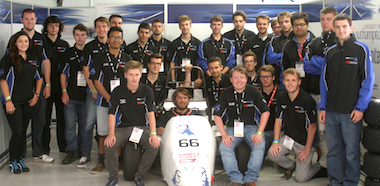 VoIP Unlimited put its full support behind the Southampton University Formula Student Team (SUFST) which competed in the the annual Formula Student UK competition at Silverstone.
VoIP Unlimited put its full support behind the Southampton University Formula Student Team (SUFST) which competed in the the annual Formula Student UK competition at Silverstone.
The team competed against almost 100 university teams from across the globe in a single-seat racing car event.
Returning for its 17th year, the three-day event saw the next generation of world-class engineers and drivers racing for record times. SUFST beat the likes of University of Exeter and City University London in the overall class 1 results, achieving 71st place.
Having entered the competition for the second year running, the team achieved its most impressive result in the business presentations judging, earning a covetable 23rd place out of the 97 teams.
acked by industry and high profile engineers, including Patron Ross Brawn OBE (former team principal, MERCEDES AMG PETRONAS F1 Team), the competition aimed to inspire and develop enterprising and innovative young engineers.
Challenged to design, build and race a single-seat racing car, the SUFST enlisted telecommunications company VoIP Unlimited as title sponsor at the start of the academic year, enabling students to design and engineer a car to withstand the dynamic event.
VoIP Unlimited's MD Mark Pillow said: "VoIP Unlimited has been more than proud to sponsor SUFST - even more so now the team has earned a well-deserved place in the record books!
"It was a joy to see the students' progress over the year with the design, build and on the final race day. They achieved so much in just a few short months."
SUFST team leader Dan Castro, added: "It's been great to have had VoIP Unlimited as a main sponsor for our team. Their knowledge, connections and experience within motorsport have proven invaluable to our development; both technically and with raising the profile of the team."
